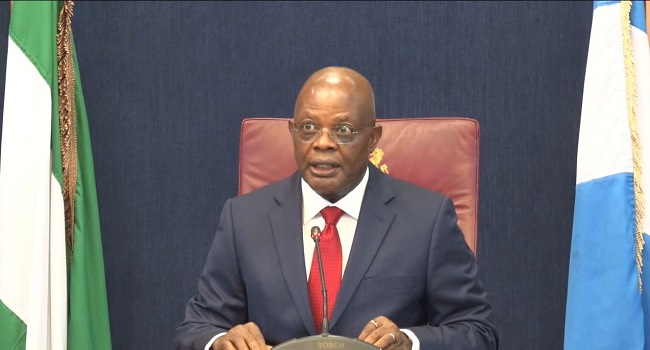The political landscape of Rivers State, Nigeria, has been embroiled in controversy following the declaration of a state of emergency by President Bola Tinubu and the subsequent suspension of Governor Siminalayi Fubara, his deputy, and the state lawmakers. This action, which installed Vice Admiral Ibok-Ete Ibas (retd.) as sole administrator, has been met with protests from Fubara’s supporters, creating a tense atmosphere in the state. The sole administrator’s spokesperson, Hector Igbikiowubo, has asserted that the gazette establishing the emergency rule grants Ibas “sweeping powers,” though he has chosen to exercise restraint in the face of ongoing demonstrations. Igbikiowubo has appealed for calm and cooperation from residents, emphasizing the need for a peaceful resolution to the political impasse. He highlighted Ibas’s engagement with stakeholder groups, such as the Christian Association of Nigeria (CAN), as evidence of his commitment to restoring democratic processes.
The crux of the controversy lies in the perceived abuse of executive power by President Tinubu. Critics argue that the declaration of a state of emergency lacks constitutional basis, as the stipulated conditions for such a measure, including war, external aggression, or a complete breakdown of public order, are not present in Rivers State. The protests, while testing the resolve of the sole administrator, underscore the public discontent with the president’s intervention. Igbikiowubo’s statements, while urging restraint, also subtly acknowledge the extensive authority granted to Ibas under the emergency rule, raising concerns about the potential for its misuse. The situation presents a delicate balance between the need for stability and the preservation of democratic rights.
The declaration of a state of emergency and the subsequent appointment of a sole administrator effectively disempowered the elected officials of Rivers State, raising fundamental questions about the rule of law and the principles of democracy. The protests serve as a visible manifestation of the resistance to this perceived power grab. While Igbikiowubo frames the sole administrator’s restraint as a positive attribute, the underlying tension remains palpable. The ongoing dialogue with stakeholders, while seemingly conciliatory, does not address the core issue of the legitimacy of the emergency rule itself.
A coalition of concerned citizens, including prominent figures like Donu Kogbara and Aleruchi Cookey-Gam, has voiced strong opposition to the President’s actions, denouncing the declaration of emergency rule as unconstitutional and a blatant disregard for the democratic rights of the people of Rivers State. Their open letter to President Tinubu, copied to the National Assembly and international bodies, demands the immediate reversal of the emergency rule and the reinstatement of the suspended elected officials. This coalition argues that the President’s actions violate Section 305(3) of the 1999 Constitution, which outlines specific and limited circumstances justifying the declaration of a state of emergency, none of which are applicable to the situation in Rivers State.
The coalition’s letter underscores the perception that the declaration of emergency rule represents a politically motivated move to consolidate power at the federal level. The demand for a full investigation into the circumstances leading to the President’s decision reflects a deep mistrust of the official narrative and a belief that the President was misled. The letter emphasizes the right of the people of Rivers State to self-determination and the importance of respecting the quasi-autonomy of the state. The involvement of prominent figures and the international circulation of the letter aim to exert pressure on the President to reconsider his actions and restore democratic processes in Rivers State.
The situation in Rivers State highlights the fragility of democratic institutions in Nigeria and the potential for executive overreach. The protests, the legal challenges, and the public outcry all underscore the importance of upholding constitutional principles and respecting the will of the people. The ongoing dialogue between the sole administrator and various stakeholders represents an attempt to navigate this complex situation, but a lasting resolution requires addressing the fundamental concerns about the legitimacy of the emergency rule itself. The future of Rivers State hinges on finding a balance between maintaining order and upholding democratic principles.


